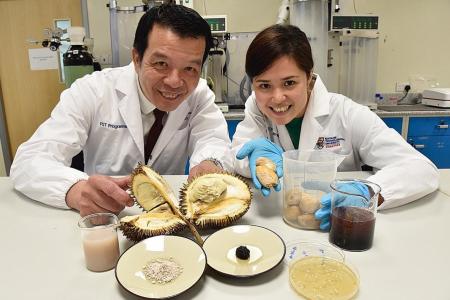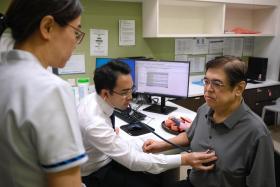NTU scientists turn durian seeds into food stabilisers and probiotics
NTU researchers believe process can also make probiotic compounds cheaper
A team of researchers at the Nanyang Technological University (NTU) may have given durian fans another reason to hail the king of fruits.
The scientists have found a way to turn durian seeds into a food stabiliser (a binding ingredient used to give food items a uniform texture) and probiotics - a good bacteria that, when consumed, helps people to maintain a healthy digestive system.
In the first half of 2018, Singaporeans consumed six million durians.
Professor William Chen, director of NTU's food science and technology programme, saw this as a golden opportunity to salvage by-products from the seeds of some 12 million durians eaten each year.
The seeds, each about 3cm to 4cm in diameter, are usually discarded after the flesh is eaten.
With a technique that has since been patented, Prof Chen's team has turned what would otherwise be food waste into usable products.
"A majority of consumer food contain food stabilisers, which are indispensable in ensuring that various ingredients that do not mix well can gel harmoniously. What we have done is to use something we often ignore when eating durians - their seeds - to produce a 100 per cent natural food stabiliser that can even keep our gut system healthy," said Prof Chen.
He said a majority of these stabilisers are now harvested from the gum of acacia trees. It is commonly imported from Africa and is not something that can be mass produced here.
Explaining the process, Prof Chen said the durian seeds are first sliced and boiled to extract the gum within. On its own, the gum can be used as a natural food stabiliser. These stabilisers, which contain sugar-protein biopolymers, are commonly used to give food products a smooth texture.
The durian gum stabiliser also holds together ingredients prone to separating - for example, when gelatin and a form of gum are added to soft candy and sweeteners. It can also act as an emulsifier in lotions and cosmetics, to prevent the ingredients from breaking apart.
But several more steps are needed to turn the gum, a cheap medium to grow bacteria, into a stabiliser with probiotics.
To grow probiotics bacteria, the durian seed gum is allowed to ferment with some added bacteria cultures for several days and centrifuged - a process that removes all moisture from a solution. The result is a light pink probiotic powder.
The scientists said compared to regular powder-based probiotics found in commercial food stabilisers, what they developed has been found to be 20 per cent more effective in keeping probiotics in the stabiliser alive.
Prof Chen believes this process will make probiotic compounds more than four times cheaper: from $60 for one litre of growth medium now in the industry, to $13 a litre.
His NTU research team is currently exploring several industry partnerships with interested companies.
Get The New Paper on your phone with the free TNP app. Download from the Apple App Store or Google Play Store now


